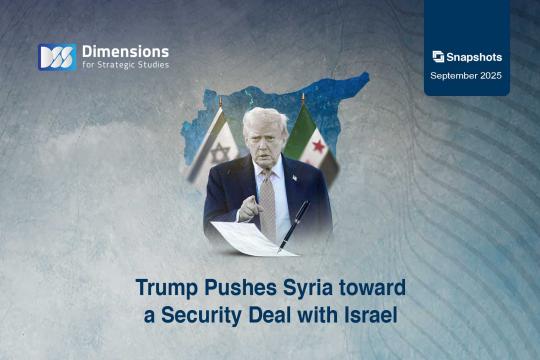
Implications of the Attack on Ankara's Security Headquarters and its Underlying Messages
2023-10-131503 view
On October 1, 2023, what was characterized as a terrorist operation struck the General Directorate of Security under the Türkyie’s Ministry of the Interior in Ankara. Notably, the Kurdistan Workers' Party (PKK) did not explicitly claim responsibility for this attack, which was executed by two individuals. It's worth noting that in recent years, the PKK has consistently refrained from claiming its operations, marking no departure from its usual strategy. The party appears to be distancing itself from the "terrorist" label by orchestrating operations through various affiliated entities. According to the Furrat News Agency (ANF), associated with the PKK, the attack was carried out by a unit of the "Khaldoun/Immortals" battalion.
Practically speaking, if another organization affiliated with the PKK claims the attack, it can be argued that the latter’s strategy of attributing its operations to a front organization in order to divert attention from itself has not been particularly successful.
Upon examining the photographs of the attackers, it becomes evident that both individuals hail from Syria and Iraq. It's worth noting that a Syrian operative was also involved in the Taksim assault on Istanbul’s Istiklal Street the previous year. This suggests that the PKK is increasingly sourcing operatives from the Syrian-Iraqi corridor, rather than relying on its domestic members in Turkey. Such a shift insinuates a potential weakening within the PKK, as they seem more inclined to enlist those of Syrian or Iraqi descent. Consequently, one might deduce that the intensified Turkish military operations have effectively pushed the PKK's operational activities into the more remote areas of Iraq and Syria.
The identity of one of the attackers remains unknown due to the burning of his body. However, the Turkish Ministry of Interior has declared that this individual was affiliated with the Kurdistan Workers' Party (PKK). A critical security concern to emphasize here is the tactics employed by the PKK to sow confusion regarding the identification of the attackers. The party disseminates false information about the names of those who executed the operations, aiming to disrupt identity verification systems.
Consequently, even in attacks for which the PKK has claimed responsibility, the attackers they have identified might not be the actual culprits. However, the identity of one of the participants in this attack was ascertained through DNA testing. The party might have disseminated false information suggesting that such individuals had lost their lives in previous attacks.
It is reportedly that the two attackers hijacked a car and killed its driver, who was a veterinarian, in the city of Kayseri before heading to Ankara. The assailants laid low in a rural area for a period before launching their assault. Among the details obtained, it was revealed that one of them used a Russian-made flamethrower with a range of 1 kilometer, while the other initiated the attack using a Colt pistol.
Fortunately, this attack did not result in any material or human losses, thanks to the security measures in place at the targeted locations. Reports also indicated that various explosives were found in the attackers' vehicle. Thus, the assailants' intent was not merely limited gunfire; they aimed for a more extensive and comprehensive raid.
When assessing the attack, two timing-related points must be highlighted: First, the assault was carried out on the day the Grand National Assembly of Turkey was inaugurated. By attempting an attack on Ankara's most significant street on the day the parliament opened, the perpetrators sought to send a political message. Their aim was to undermine Turkey's internal political stability and convey a message that even Turkey's most crucial stronghold in the heart of its capital was vulnerable.
The second crucial point concerning the attack's timing relates to the phase the Kurdistan Workers' Party (PKK) is currently undergoing. As widely acknowledged, the Turkish government has conducted numerous operations against the PKK and its offshoots, both domestically and abroad, in recent years, neutralizing high-ranking members of the party. The PKK, facing significant setbacks and having suffered substantial material and human losses, sought through this attack to demonstrate that they remain resilient, present, and capable of executing assaults even within the heartland of the Turkish Republic.
It's imperative to note that this attack was a suicide mission. Typically, it's exceptionally challenging for armed groups to carry out suicide operations due to the inherent requirement of selecting members with the will and determination to undertake such actions. The PKK, having faced numerous challenges, attempts to prove that loyalty to the party still exists among its ranks by executing such suicidal acts. Thus, the party employs these attacks as a propagandistic and mobilizing tool, signaling the continued dedication of those fervently committed to its cause.
Finally, the attack can be assessed from two perspectives within the context of Turkey's domestic politics. The first point pertains to the message conveyed by the PKK regarding the municipal elections set for March 2024. As is well-known, there are significant disagreements between the PKK and the Peoples' Democratic Party (HPD), which is considered affiliated with it. In fact, the former leader of the HPD, Selahattin Demirtaş, announced his departure from active politics while in prison due to these disputes.
The PKK is attempting to coerce the HDP to align more closely with its stance by amplifying state pressure on the HDP through the execution of such armed actions. At this stage, the PKK aims to push the HDP to adopt its Qandil-based approach; thus, the PKK seeks to achieve a political objective through its violent activities. Ahead of the local elections, the PKK sends a message to the HDP, asserting that they cannot engage in politics without the knowledge and consent of Qandil. We do not know how the HDP will respond to this message, but it can certainly be said that there is a faction within the HDP that does not want to remain wholly dependent and tied to the PKK.
Despite this attack, it is noticeable that stability and the general routine in Turkish domestic politics continue as usual. The Grand National Assembly of Turkey was inaugurated, President Erdoğan attended the opening and the subsequent official celebrations, and there were no security issues. Therefore, we believe that this attack in Ankara will not adversely affect the Turkish government's resolve to combat the PKK. It is expected that Turkey will continue its hardline stance and persistent fight against the PKK and its affiliates.





